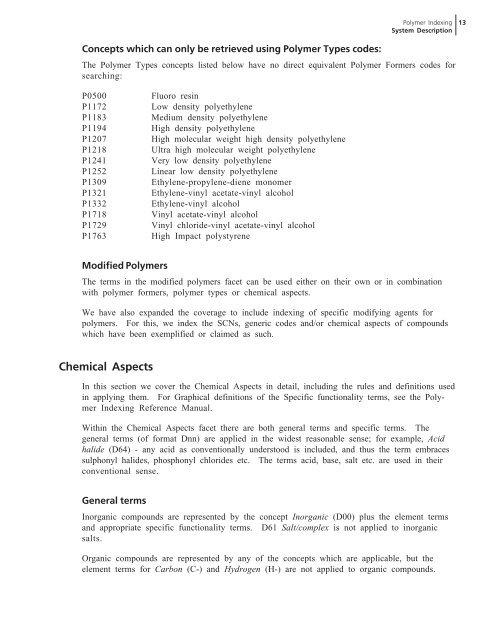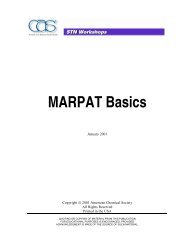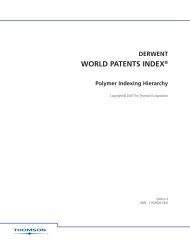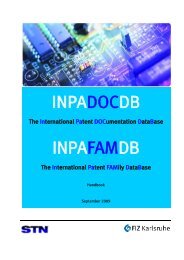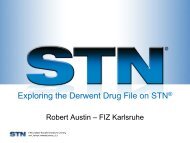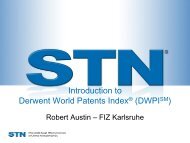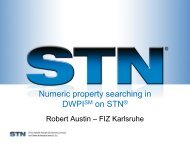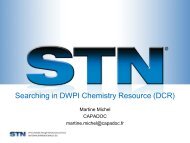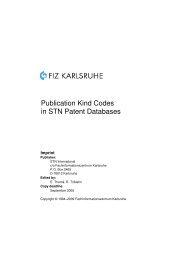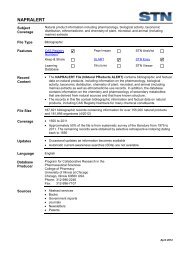- Page 1 and 2: DERWENT WORLD PATENTS INDEX ® Poly
- Page 3: Polymer Indexing System Description
- Page 7: Polymer Indexing System Description
- Page 10 and 11: 6 Chemicals The Chemicals (low mole
- Page 12 and 13: 8 Additives The Additives facet con
- Page 14 and 15: 10 • Specific chemical functions,
- Page 18 and 19: 14 Bridged ring - must contain 2 at
- Page 20 and 21: 16 If no single specific functional
- Page 23 and 24: Polymer Indexing System Description
- Page 25 and 26: Polymer Indexing System Description
- Page 27 and 28: Polymer Indexing System Description
- Page 29 and 30: Polymer Indexing System Description
- Page 31 and 32: Polymer Indexing System Description
- Page 33 and 34: Polymer Indexing System Description
- Page 35 and 36: Polymer Indexing System Description
- Page 37 and 38: Polymer Indexing System Description
- Page 39 and 40: Polymer Indexing System Description
- Page 41 and 42: Generic compounds Polymer Indexing
- Page 43 and 44: Polymer Indexing System Description
- Page 45 and 46: Polymer Indexing System Description
- Page 47 and 48: Polymer Indexing System Description
- Page 49 and 50: Polymer Indexing System Description
- Page 51 and 52: Polymer Indexing System Description
- Page 53 and 54: Polymer Indexing System Description
- Page 55 and 56: Polymer Indexing System Description
- Page 57 and 58: Polymer Indexing System Description
- Page 59 and 60: Polymer Indexing System Description
- Page 61: Polymer Indexing System Description
- Page 64 and 65: 60 † When the Polymer former, Pol
- Page 66 and 67:
62 Polymer Type (2) (Polymer Former
- Page 68 and 69:
64 Epoxidised Butadiene Homopolymer
- Page 70 and 71:
66 Polymer Type (2) Chemical proces
- Page 72 and 73:
68 Modifying Agent (3) Polymer Desc
- Page 74 and 75:
70 Catalyst N/A Chemical process Ch
- Page 77 and 78:
Polymer Indexing System Description
- Page 79 and 80:
DERWENT WORLD PATENTS INDEX ® Poly
- Page 81:
Polymer Indexing Hierarchy Contents
- Page 85:
Polymer Indexing Hierarchy Polymer
- Page 88 and 89:
6 H0168 Head-to-head polymer H0179
- Page 90 and 91:
8 Indexing Conventions: Acrylic fib
- Page 92 and 93:
10 G0179 NT Vinyl phenol “Mono su
- Page 94 and 95:
12 R24099 NT Adamantyl methacrylate
- Page 96 and 97:
14 R05167 NT Dioctyl maleate R06723
- Page 98 and 99:
16 R00952 NT Tetraethylene glycol R
- Page 100 and 101:
18 R01060 NT Adipic acid UF Hexaned
- Page 102 and 103:
20 G1616 NT Oxacyclobutane, other R
- Page 104 and 105:
22 G1945 NT Polyisocyanates R24058
- Page 106 and 107:
24 R23114 NT Dimethyldimethoxysilan
- Page 109 and 110:
Polymer Indexing Hierarchy Polymer
- Page 111 and 112:
Polymer Indexing Hierarchy Polymer
- Page 113 and 114:
Polymer Indexing Hierarchy Polymer
- Page 115 and 116:
P1489 Polysulphonamide UF Polysulfo
- Page 117:
Polymer Indexing Hierarchy Polymer
- Page 121 and 122:
Polymer Indexing Hierarchy Natural
- Page 123:
Polymer Indexing Hierarchy Modified
- Page 126 and 127:
44 M2277 Halosulphonated polymer UF
- Page 129:
Polymer Indexing Hierarchy Chemical
- Page 132 and 133:
50 R01949 R01432 R01892 Aluminium s
- Page 134 and 135:
52 R05044 G2540 Benzothiazole-2-sul
- Page 136 and 137:
54 R01503 Calcium oxide G3509 Calci
- Page 138 and 139:
56 R01950 Cyclohexanone peroxide R0
- Page 140 and 141:
58 G3485 Dihydroxybenzophenones (ge
- Page 142 and 143:
60 G2835 Ethoxylated alkyl phenols
- Page 144 and 145:
62 R00253 Hydroxybenzamide, 2- UF S
- Page 146 and 147:
64 R00201 Mercaptoethanol G2960 Mer
- Page 148 and 149:
66 R08433 Octane R01061 Octanoic ac
- Page 150 and 151:
68 R05310 R01730 R01737 Potassium o
- Page 152 and 153:
70 R05332 Stearoyl-4-aminophenol, N
- Page 154 and 155:
72 G3281 Titanium chlorides (gen)
- Page 156 and 157:
74 R01408 R05423 R00729 G3407 R0542
- Page 159 and 160:
Polymer Indexing Hierarchy Chemical
- Page 161 and 162:
Polymer Indexing Hierarchy Chemical
- Page 163 and 164:
Polymer Indexing Hierarchy Chemical
- Page 165 and 166:
Polymer Indexing Hierarchy Chemical
- Page 167 and 168:
Polymer Indexing Hierarchy Chemical
- Page 169 and 170:
Polymer Indexing Hierarchy Chemical
- Page 171:
Polymer Indexing Hierarchy Chemical
- Page 175:
Polymer Indexing Hierarchy Novelty
- Page 179 and 180:
Polymer Indexing Hierarchy Universa
- Page 181 and 182:
K9789 Prepreg K9790 Radiation K9803
- Page 183 and 184:
Polymer Indexing Hierarchy Shape &
- Page 185 and 186:
Polymer Indexing Hierarchy Shape &
- Page 187 and 188:
S1525 Platelet UF Flake S1536 Prefo
- Page 189 and 190:
Polymer Indexing Hierarchy Additive
- Page 191 and 192:
Polymer Indexing Hierarchy Additive
- Page 193 and 194:
Polymer Indexing Hierarchy Additive
- Page 195 and 196:
Polymer Indexing Hierarchy Catalyst
- Page 197 and 198:
Polymer Indexing Hierarchy Catalyst
- Page 199 and 200:
Polymer Indexing Hierarchy Chemical
- Page 201 and 202:
Polymer Indexing Hierarchy Chemical
- Page 203 and 204:
Polymer Indexing Hierarchy Chemical
- Page 205 and 206:
Polymer Indexing Hierarchy Physical
- Page 207 and 208:
Polymer Indexing Hierarchy Physical
- Page 209 and 210:
Polymer Indexing Hierarchy Physical
- Page 211 and 212:
Polymer Indexing Hierarchy Physical
- Page 213 and 214:
Polymer Indexing Hierarchy Equipmen
- Page 215 and 216:
Polymer Indexing Hierarchy Equipmen
- Page 217 and 218:
Properties Polymer Indexing Hierarc
- Page 219 and 220:
Polymer Indexing Hierarchy Properti
- Page 221 and 222:
Polymer Indexing Hierarchy Properti
- Page 223 and 224:
Polymer Indexing Hierarchy Properti
- Page 225 and 226:
B4557 Smoke suppression SA Smoke ge
- Page 227 and 228:
Polymer Indexing Hierarchy Properti
- Page 229 and 230:
Polymer Indexing Hierarchy Applicat
- Page 231 and 232:
Polymer Indexing Hierarchy Applicat
- Page 233 and 234:
Polymer Indexing Hierarchy Applicat
- Page 235 and 236:
Polymer Indexing Hierarchy Applicat
- Page 237 and 238:
Polymer Indexing Hierarchy Applicat
- Page 239 and 240:
Polymer Indexing Hierarchy Applicat
- Page 241 and 242:
Polymer Indexing Hierarchy Applicat
- Page 243 and 244:
Polymer Indexing Hierarchy Applicat
- Page 245 and 246:
DERWENT WORLD PATENTS INDEX ® Poly
- Page 247:
Contents Polymer Indexing Reference
- Page 251:
Polymer Indexing Reference Manual C
- Page 254 and 255:
4 A260 Foaming agent A999 A260-R A4
- Page 256 and 257:
6 B3236 Discharge effects B9999 B32
- Page 258 and 259:
8 B4104 Brittleness B9999 B4104 B40
- Page 260 and 261:
10 B4988 Curable B9999 B4988-R B497
- Page 262 and 263:
12 C099 C102 C113 C124 C135 C146 C1
- Page 264 and 265:
14 D48 Ring containing other elemen
- Page 266 and 267:
16 E35 Polyacyl-, other E35 E30 E36
- Page 268 and 269:
18 F81 Si-O-Si F81 F82 Si-N-Si F82
- Page 270 and 271:
20 G0442 Acrylic ester monoolefinic
- Page 272 and 273:
22 G1105 Monophenols G1105-R G1092
- Page 274 and 275:
24 G1843 G1854 G1865 G1876 Isocyana
- Page 276 and 277:
26 G2675 G2686 G2697 Chromium chlor
- Page 278 and 279:
28 G3430 G3441 G3452 G3463 G3474 Xy
- Page 280 and 281:
30 H0237 H0248 H0259 H0260 H0271 H0
- Page 282 and 283:
32 K9698 K9701 K9712 K9723 K9734 K9
- Page 284 and 285:
34 L2584 L2595 L2608 L2619 L2620 L2
- Page 286 and 287:
36 M9999 Md Mg Mn Mo Modified Polym
- Page 288 and 289:
38 N6520 Rotational moulding N9999
- Page 290 and 291:
40 ND04 ND05 ND06 ND07 ND08 ND09 Co
- Page 292 and 293:
42 P0691 Nylon 6,6 P0691 P1934 P063
- Page 294 and 295:
44 P1467 P1478 P1489 P1490 P1503 P1
- Page 296 and 297:
46 Pt Platinum Pt 8B Tr Q6804 Bookb
- Page 298 and 299:
48 Q7465 Resistors Q9999 Q7465 Q733
- Page 300 and 301:
50 Q8344 Optical fibres and cables
- Page 302 and 303:
52 Q9223 Q9234 Q9245 Q9256 Q9267 Q9
- Page 304 and 305:
54 R00355 Isobutane R00355 D01 D02
- Page 306 and 307:
56 R00540 R00554 Tartaric acid R005
- Page 308 and 309:
58 R00739 R00740 R00741 R00743 Diph
- Page 310 and 311:
60 R00898 R00899 R00900 R00901 Thio
- Page 312 and 313:
62 R01059 Azelaic acid R01059 G1343
- Page 314 and 315:
64 R01353 R01356 R01359 R01363 R013
- Page 316 and 317:
66 R01565 R01592 Mercury(II) acetat
- Page 318 and 319:
68 R01861 R01863 R01865 R01866 R018
- Page 320 and 321:
70 R03652 R03806 R03807 Glyceryl-1,
- Page 322 and 323:
72 R05082 R05085 R05086 R05089 Cadm
- Page 324 and 325:
74 R05183 R05184 R05188 R05190 R051
- Page 326 and 327:
76 R05288 Diphenyl n-octyl phosphat
- Page 328 and 329:
78 R05374 R05375 R05377 R05378 R053
- Page 330 and 331:
80 R07859 Diaminodiphenyl ether, 3,
- Page 332 and 333:
82 R13156 Citraconic anhydride (96)
- Page 334 and 335:
84 R24008 R24009 R24010 R24011 R240
- Page 336 and 337:
86 R24066 R24067 R24068 R24069 R240
- Page 338 and 339:
88 S1150 Elastic fibre S9999 S1150
- Page 341:
POLYMER INDEXING MOLECULAR FORMULA
- Page 345 and 346:
Polymer Indexing Reference Manual M
- Page 347 and 348:
Polymer Indexing Reference Manual M
- Page 349 and 350:
Polymer Indexing Reference Manual M
- Page 351 and 352:
Polymer Indexing Reference Manual M
- Page 353 and 354:
Polymer Indexing Reference Manual M
- Page 355 and 356:
Polymer Indexing Reference Manual M
- Page 357 and 358:
Polymer Indexing Reference Manual M
- Page 359 and 360:
Polymer Indexing Reference Manual M
- Page 361 and 362:
Polymer Indexing Reference Manual M
- Page 363 and 364:
Polymer Indexing Reference Manual M
- Page 365 and 366:
Polymer Indexing Reference Manual M
- Page 367 and 368:
Polymer Indexing Reference Manual M
- Page 369 and 370:
Polymer Indexing Reference Manual M
- Page 371 and 372:
C 10 H 10 Cl 2 Zr R24104 Zirconium
- Page 373 and 374:
C 11 H 21 N 3 R05062 Butyl azo-2,4-
- Page 375 and 376:
Polymer Indexing Reference Manual M
- Page 377 and 378:
Polymer Indexing Reference Manual M
- Page 379 and 380:
Polymer Indexing Reference Manual M
- Page 381 and 382:
C 18 H 34 NO 3 S R24065 Ammonium do
- Page 383 and 384:
Polymer Indexing Reference Manual M
- Page 385 and 386:
Polymer Indexing Reference Manual M
- Page 387 and 388:
Polymer Indexing Reference Manual M
- Page 389 and 390:
Polymer Indexing Reference Manual M
- Page 391 and 392:
Polymer Indexing Reference Manual M
- Page 393:
POLYMER INDEXING CHEMICAL ASPECTS G
- Page 396 and 397:
142
- Page 398 and 399:
144 CH 3 E08 Methyl nadi- O O Cl Cl
- Page 400 and 401:
146 O O E23 SO 3 H! O C E24 Sulphoi
- Page 402 and 403:
148 S: F00 Sulphide S F01 Disulphid
- Page 404 and 405:
150 F96 Carbodiimide C! N C N C! F9
- Page 406 and 407:
152 O F38 Tricarboxylic acid CH C O
- Page 408 and 409:
154 PO/S: F52 Phosphite P O O O O O
- Page 410 and 411:
156 O F71 Lactam C! C N C! ring O O
- Page 412 and 413:
158
- Page 414 and 415:
Copyright © 2004 The Thomson Corpo
- Page 417 and 418:
Polymer Indexing Thesaurus 1 Introd
- Page 419 and 420:
Polymer Indexing Thesaurus 3 B5049
- Page 421 and 422:
Polymer Indexing Thesaurus 5 R00675
- Page 423 and 424:
L2017 Acrylation [chemical processe
- Page 425 and 426:
Polymer Indexing Thesaurus 9 R13150
- Page 427 and 428:
Polymer Indexing Thesaurus 11 G4079
- Page 429 and 430:
Polymer Indexing Thesaurus 13 Q8402
- Page 431 and 432:
Polymer Indexing Thesaurus 15 P0328
- Page 433 and 434:
Polymer Indexing Thesaurus 17 G0726
- Page 435 and 436:
Polymer Indexing Thesaurus 19 G2073
- Page 437 and 438:
Polymer Indexing Thesaurus 21 K9632
- Page 439 and 440:
Polymer Indexing Thesaurus 23 B3247
- Page 441 and 442:
Polymer Indexing Thesaurus 25 R0816
- Page 443 and 444:
Polymer Indexing Thesaurus 27 R0009
- Page 445 and 446:
Polymer Indexing Thesaurus 29 R2409
- Page 447 and 448:
Polymer Indexing Thesaurus 31 {Bis(
- Page 449 and 450:
Polymer Indexing Thesaurus 33 G1218
- Page 451 and 452:
Polymer Indexing Thesaurus 35 C180
- Page 453 and 454:
Polymer Indexing Thesaurus 37 B4104
- Page 455 and 456:
Polymer Indexing Thesaurus 39 R0362
- Page 457 and 458:
Polymer Indexing Thesaurus 41 R0030
- Page 459 and 460:
Polymer Indexing Thesaurus 43 R0141
- Page 461 and 462:
Polymer Indexing Thesaurus 45 G2631
- Page 463 and 464:
Polymer Indexing Thesaurus 47 R0106
- Page 465 and 466:
Polymer Indexing Thesaurus 49 Q8468
- Page 467 and 468:
Polymer Indexing Thesaurus 51 {Cell
- Page 469 and 470:
Polymer Indexing Thesaurus 53 R2410
- Page 471 and 472:
Polymer Indexing Thesaurus 55 R0323
- Page 473 and 474:
Polymer Indexing Thesaurus 57 R1069
- Page 475 and 476:
Polymer Indexing Thesaurus 59 N5754
- Page 477 and 478:
Polymer Indexing Thesaurus 61 Co Co
- Page 479 and 480:
Polymer Indexing Thesaurus 63 Q7249
- Page 481 and 482:
Polymer Indexing Thesaurus 65 S1149
- Page 483 and 484:
Polymer Indexing Thesaurus 67 {Coro
- Page 485 and 486:
Polymer Indexing Thesaurus 69 A180
- Page 487 and 488:
Polymer Indexing Thesaurus 71 G0099
- Page 489 and 490:
Polymer Indexing Thesaurus 73 N6280
- Page 491 and 492:
Polymer Indexing Thesaurus 75 B4831
- Page 493 and 494:
Polymer Indexing Thesaurus 77 R0109
- Page 495 and 496:
Polymer Indexing Thesaurus 79 G1718
- Page 497 and 498:
Polymer Indexing Thesaurus 81 G1343
- Page 499 and 500:
Polymer Indexing Thesaurus 83 {Dica
- Page 501 and 502:
Polymer Indexing Thesaurus 85 B3203
- Page 503 and 504:
Polymer Indexing Thesaurus 87 G2799
- Page 505 and 506:
Polymer Indexing Thesaurus 89 {Dilu
- Page 507 and 508:
Polymer Indexing Thesaurus 91 {Dime
- Page 509 and 510:
Polymer Indexing Thesaurus 93 F32 D
- Page 511 and 512:
Polymer Indexing Thesaurus 95 S1014
- Page 513 and 514:
Polymer Indexing Thesaurus 97 R1485
- Page 515 and 516:
Polymer Indexing Thesaurus 99 B4002
- Page 517 and 518:
Polymer Indexing Thesaurus 101 B319
- Page 519 and 520:
Polymer Indexing Thesaurus 103 B329
- Page 521 and 522:
Polymer Indexing Thesaurus 105 R007
- Page 523 and 524:
Polymer Indexing Thesaurus ND05 Equ
- Page 525 and 526:
Polymer Indexing Thesaurus 109 R007
- Page 527 and 528:
Polymer Indexing Thesaurus 111 {Eth
- Page 529 and 530:
Polymer Indexing Thesaurus 113 N597
- Page 531 and 532:
Polymer Indexing Thesaurus 115 S123
- Page 533 and 534:
Polymer Indexing Thesaurus 117 {Flu
- Page 535 and 536:
Polymer Indexing Thesaurus 119 {Fre
- Page 537 and 538:
Polymer Indexing Thesaurus 121 {Geo
- Page 539 and 540:
Polymer Indexing Thesaurus 123 R172
- Page 541 and 542:
Polymer Indexing Thesaurus 125 2B G
- Page 543 and 544:
Polymer Indexing Thesaurus 127 9B G
- Page 545 and 546:
Polymer Indexing Thesaurus 129 M227
- Page 547 and 548:
Polymer Indexing Thesaurus 131 R020
- Page 549 and 550:
Polymer Indexing Thesaurus 133 R153
- Page 551 and 552:
Polymer Indexing Thesaurus 135 Q708
- Page 553 and 554:
Polymer Indexing Thesaurus 137 L231
- Page 555 and 556:
Polymer Indexing Thesaurus 139 M232
- Page 557 and 558:
Polymer Indexing Thesaurus 141 D100
- Page 559 and 560:
Polymer Indexing Thesaurus K9483 In
- Page 561 and 562:
Polymer Indexing Thesaurus 145 R019
- Page 563 and 564:
Polymer Indexing Thesaurus 147 M234
- Page 565 and 566:
Polymer Indexing Thesaurus 149 E03
- Page 567 and 568:
Polymer Indexing Thesaurus 151 G208
- Page 569 and 570:
Polymer Indexing Thesaurus 153 G293
- Page 571 and 572:
Polymer Indexing Thesaurus 155 B492
- Page 573 and 574:
Polymer Indexing Thesaurus 157 H020
- Page 575 and 576:
Polymer Indexing Thesaurus 159 Q786
- Page 577 and 578:
Polymer Indexing Thesaurus 161 Q803
- Page 579 and 580:
Polymer Indexing Thesaurus 163 D68
- Page 581 and 582:
Polymer Indexing Thesaurus 165 G030
- Page 583 and 584:
Polymer Indexing Thesaurus 167 P044
- Page 585 and 586:
Polymer Indexing Thesaurus 169 R006
- Page 587 and 588:
Polymer Indexing Thesaurus 171 J643
- Page 589 and 590:
Polymer Indexing Thesaurus 173 D14
- Page 591 and 592:
Polymer Indexing Thesaurus 175 {Moo
- Page 593 and 594:
Polymer Indexing Thesaurus 177 R120
- Page 595 and 596:
Polymer Indexing Thesaurus 179 R006
- Page 597 and 598:
Polymer Indexing Thesaurus 181 R012
- Page 599 and 600:
Polymer Indexing Thesaurus 183 R010
- Page 601 and 602:
Polymer Indexing Thesaurus 185 Q893
- Page 603 and 604:
Polymer Indexing Thesaurus 187 H042
- Page 605 and 606:
Polymer Indexing Thesaurus 189 Q857
- Page 607 and 608:
Polymer Indexing Thesaurus 191 {Pen
- Page 609 and 610:
Polymer Indexing Thesaurus 193 P061
- Page 611 and 612:
Polymer Indexing Thesaurus 195 {Pho
- Page 613 and 614:
Polymer Indexing Thesaurus 197 ND07
- Page 615 and 616:
Polymer Indexing Thesaurus 199 {PMM
- Page 617 and 618:
Polymer Indexing Thesaurus 201 G138
- Page 619 and 620:
Polymer Indexing Thesaurus 203 P092
- Page 621 and 622:
Polymer Indexing Thesaurus 205 G108
- Page 623 and 624:
Polymer Indexing Thesaurus 207 K957
- Page 625 and 626:
Polymer Indexing Thesaurus 209 P115
- Page 627 and 628:
Polymer Indexing Thesaurus 211 P817
- Page 629 and 630:
Polymer Indexing Thesaurus 213 P157
- Page 631 and 632:
Polymer Indexing Thesaurus 215 {Pot
- Page 633 and 634:
Polymer Indexing Thesaurus 217 R013
- Page 635 and 636:
Polymer Indexing Thesaurus 219 N665
- Page 637 and 638:
Polymer Indexing Thesaurus 221 B438
- Page 639 and 640:
Polymer Indexing Thesaurus 223 {Ref
- Page 641 and 642:
Polymer Indexing Thesaurus 225 Rh R
- Page 643 and 644:
Polymer Indexing Thesaurus 227 R240
- Page 645 and 646:
Polymer Indexing Thesaurus 229 A668
- Page 647 and 648:
Polymer Indexing Thesaurus 231 B416
- Page 649 and 650:
Polymer Indexing Thesaurus 233 {Sil
- Page 651 and 652:
Polymer Indexing Thesaurus 235 Na S
- Page 653 and 654:
Polymer Indexing Thesaurus 237 R010
- Page 655 and 656:
Polymer Indexing Thesaurus 239 N580
- Page 657 and 658:
Polymer Indexing Thesaurus 241 A486
- Page 659 and 660:
Polymer Indexing Thesaurus 243 B494
- Page 661 and 662:
Polymer Indexing Thesaurus 245 B474
- Page 663 and 664:
Polymer Indexing Thesaurus 247 R013
- Page 665 and 666:
Polymer Indexing Thesaurus 249 {Sul
- Page 667 and 668:
Polymer Indexing Thesaurus 251 A566
- Page 669 and 670:
Polymer Indexing Thesaurus 253 B450
- Page 671 and 672:
Polymer Indexing Thesaurus 255 R053
- Page 673 and 674:
Polymer Indexing Thesaurus 257 R128
- Page 675 and 676:
Polymer Indexing Thesaurus 259 F05
- Page 677 and 678:
Polymer Indexing Thesaurus 261 R053
- Page 679 and 680:
Polymer Indexing Thesaurus 263 {Tol
- Page 681 and 682:
Polymer Indexing Thesaurus 265 R053
- Page 683 and 684:
Polymer Indexing Thesaurus 267 {Tri
- Page 685 and 686:
Polymer Indexing Thesaurus 269 R004
- Page 687 and 688:
Polymer Indexing Thesaurus 271 Q849
- Page 689 and 690:
Polymer Indexing Thesaurus 273 G067
- Page 691 and 692:
Polymer Indexing Thesaurus 275 N727
- Page 693 and 694:
Polymer Indexing Thesaurus 277 R003
- Page 695 and 696:
Polymer Indexing Thesaurus 279 R007
- Page 697 and 698:
Polymer Indexing Thesaurus 281 R240
- Page 699 and 700:
Polymer Indexing Thesaurus 283 B350
- Page 701 and 702:
Polymer Indexing Thesaurus 285 K959
- Page 703 and 704:
Polymer Indexing Thesaurus 287 R011


